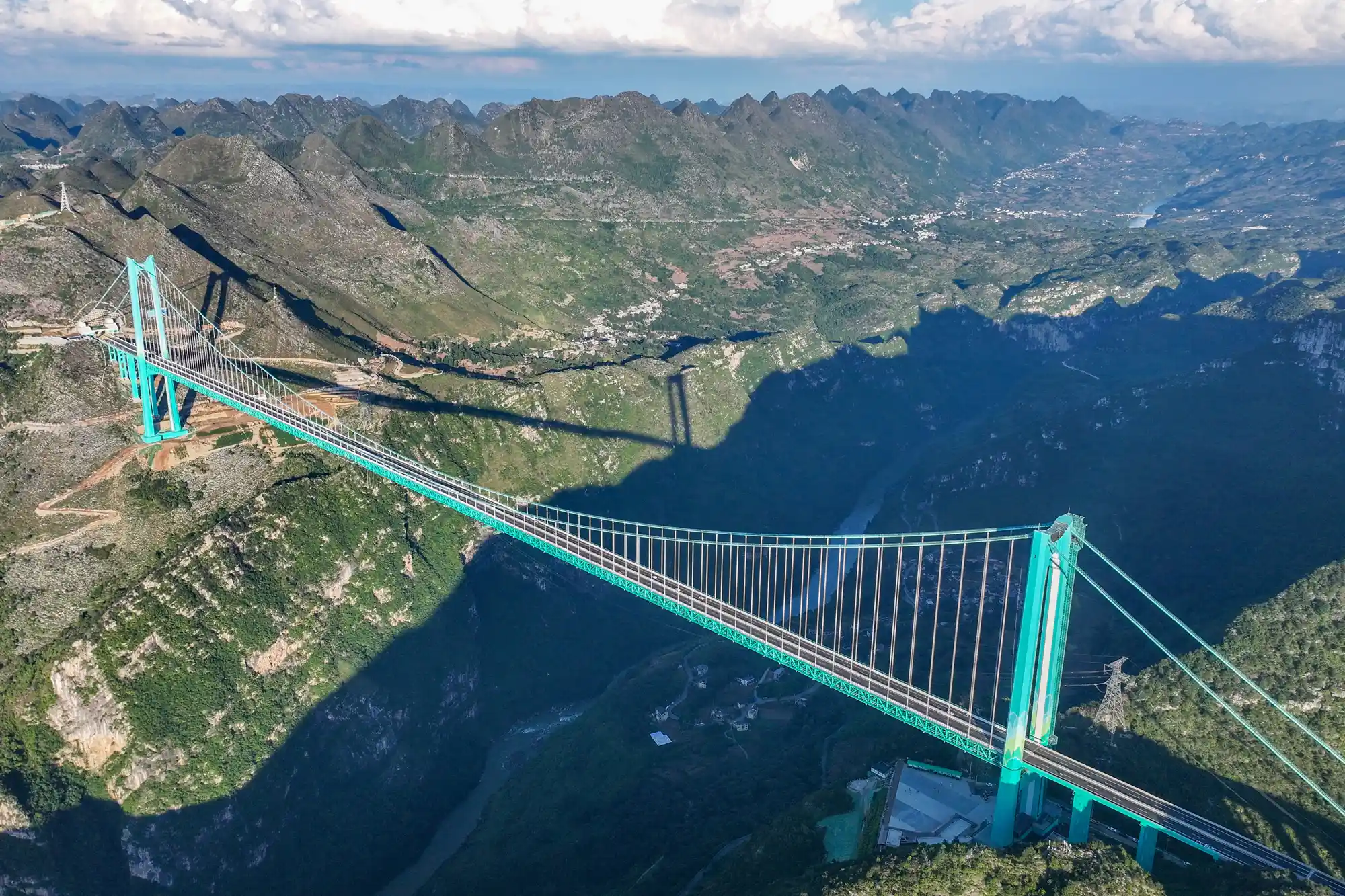High above the misty peaks of southern China, a jaw-dropping new landmark is changing what we thought was possible in bridge engineering. The Huajiang Grand Canyon Bridge — now officially the tallest bridge on Earth — opened to traffic on September 28, turning what used to be a grueling two-hour journey across rugged terrain into a quick, two-minute drive.
At a staggering 2,050 feet above the Beipan River, this bridge stands so high that clouds often pass beneath it. Stretching nearly 4,600 feet from end to end, it’s also the world’s longest bridge in a mountainous region — about four times the height of the Eiffel Tower.
A Record-Breaking Feat of Engineering
The Huajiang Grand Canyon Bridge has dethroned its neighbor, the Beipanjiang Bridge, as the tallest in the world. It took almost four years to complete — three years and eight months of grit, precision, and pure engineering brilliance. Workers faced punishing conditions: steep cliffs, unpredictable weather, and logistical puzzles that would’ve tested any team. Yet, the end result is nothing short of spectacular — a masterpiece that fuses functionality with breathtaking beauty.
But this isn’t just a triumph of design. The Chinese government’s goal goes beyond engineering bragging rights. By linking isolated mountain communities with larger cities and tourist hotspots, the bridge is expected to ignite economic growth throughout the region. Officials even hope the bridge itself becomes a tourism magnet — and it’s already delivering on that front.
Coffee Shops in the Clouds
Here’s something you don’t see every day: a café perched 2,600 feet above a river. One of the bridge’s soaring pylons houses what may be the world’s highest coffee shop. Visitors can ride a high-speed elevator to the top, sip a latte, and gaze out over the canyon as if floating among the clouds.
For those craving something bolder than caffeine, adventure is built right into the structure. The site features bungee jumping directly from the bridge deck and a glass walkway suspended 1,900 feet above the river — transparent enough to make even the bravest knees wobble.
Why Guizhou Keeps Building Record Bridges
You might be wondering — why does Guizhou keep breaking its own bridge records? The answer lies in the land itself. This province is carved with towering mountains, deep gorges, and winding rivers that make road travel notoriously difficult. Traditional roads here would mean endless switchbacks and half-day detours. Suspension bridges like the Huajiang slash those travel times dramatically, knitting together communities that once felt worlds apart.
And for locals, this isn’t just about spectacle or speed. When a two-hour trip becomes a two-minute hop, it transforms everything — from school commutes and business deliveries to family visits and emergency services.
The Numbers at a Glance
| Feature | Huajiang Grand Canyon Bridge | Beipanjiang Bridge | Royal Gorge Bridge (USA) |
|---|---|---|---|
| Height above river | ~2,050 feet | ~1,854 feet | 956 feet |
| Length | 4,600 feet | 4,400 feet | 1,260 feet |
| Location | Guizhou, China | Guizhou, China | Colorado, USA |
| Year opened | 2024 | 2016 | 1929 |
| Commute reduction | 2 hours → 2 minutes | N/A | Primarily tourist use |
Putting It in Perspective
To really grasp the scale of this bridge, imagine stacking New York’s One World Trade Center — the tallest building in the U.S. — and then adding another tower nearly as tall right beneath it. That’s the height of the Huajiang Bridge.
For comparison, America’s own Royal Gorge Bridge in Colorado — once the highest in the world — now stands at less than half the height. Still, it remains a national treasure and a beloved tourist destination, drawing thousands every year to marvel at its sweeping canyon views.
The Huajiang Grand Canyon Bridge, on the other hand, represents the next chapter of human ingenuity — a reminder that no mountain, canyon, or obstacle is too vast when vision meets engineering. It’s more than a shortcut across the Beipan River; it’s a symbol of connection, progress, and the unshakable drive to reach higher than ever before.






